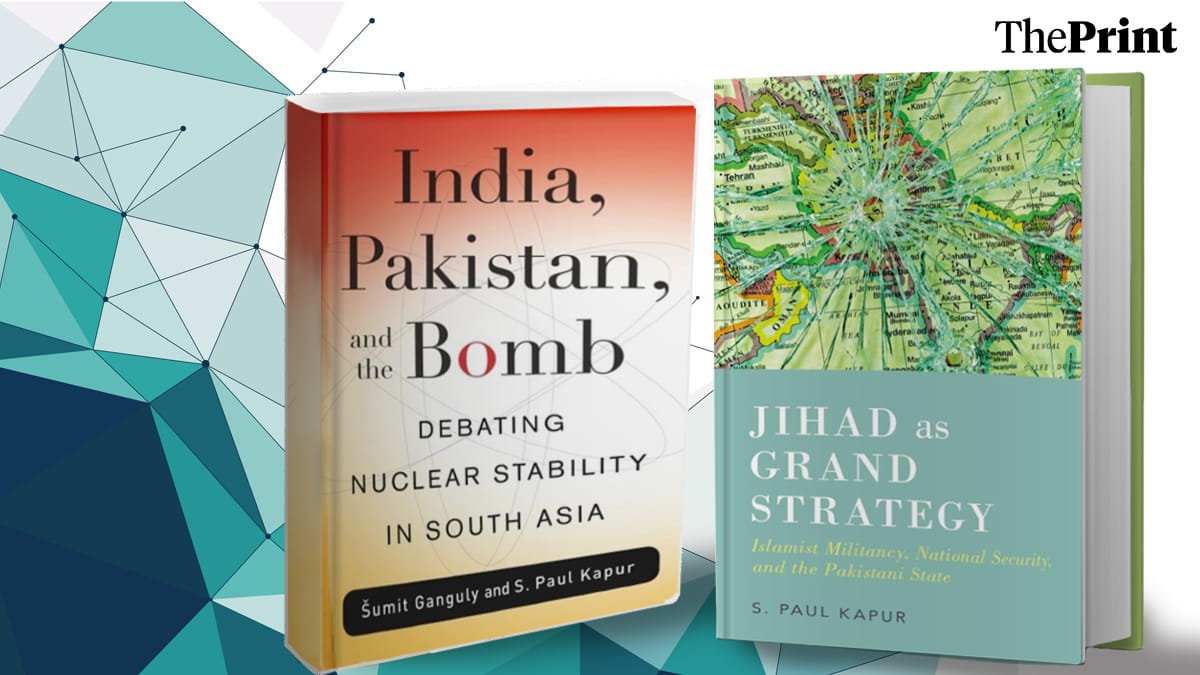New Delhi: S. Paul Kapur, Donald Trump’s Indian-origin pick for the US state department’s South Asia bureau, has been a fierce critic of Pakistan-based militant groups and argued in his 2016 book that “Jihad or support for Islamist militants has constituted a central pillar of Pakistan’s ‘grand strategy’, and is not just ‘one among many tools of Pakistani statecraft’.”
“The consequences of Pakistan-based militancy reach far beyond particular acts of violence or even South Asian regional politics—they severely damage stability and security across the globe,” he wrote in Jihad as Grand Strategy: Islamist Militancy, National Security and the Pakistani State.
Kapur, known for his extensive research on South Asian security and nuclear policy, has been nominated by the US President as assistant secretary of state for South Asian affairs.
If confirmed by the Senate, he will succeed Donald Lu, who completed his term on 17 January. Until then, Eric Meyer, the former US chargé d’affaires in Oslo, was serving as the senior bureau official for the region.
Kapur, who is a professor in the Department of National Security Affairs at the US Naval Postgraduate School and a fellow at Stanford’s Hoover Institution, previously served on the state department’s policy planning staff during the final year of the previous Trump administration. At the time, he worked on South Asia and Indo-Pacific security issues.
Kapur has also written other books such as Dangerous Deterrent: Nuclear Weapons Proliferation and Conflict in South Asia and India, Pakistan, and the Bomb: Debating Nuclear Stability in South Asia.

Also Read: Rana extradition certain, but US yet to open cards on a deadlier 26/11 face—Headley, its intel asset
‘Militancy is Pakistani state policy’
In his 2016 book, Kapur also argued that Pakistan’s use of Islamist militancy is not a byproduct of instability but a deliberate state policy. Pakistan’s military and intelligence agencies have actively nurtured these militant groups as a cost-effective means of challenging a much larger India and maintaining influence in Afghanistan, he submitted.
Kapur warned that this strategy has now spiraled out of control, with militant groups increasingly acting autonomously and sometimes even turning against the state.
“Pakistan thus suffers from a ‘jihad paradox’. Political and material weakness originally made Pakistan’s militant policy attractive and useful. Now, however, that same weakness makes Pakistan’s support for militancy extremely dangerous. Thus, despite its past benefits, the strategy has outlived its utility, and Pakistan will have to abandon it to avoid catastrophe”, he wrote.
He then warned other “weak states” who rely on non-state actors as strategic tools to take “the Pakistani case as a cautionary lesson”.
He also added that supporting militancy has been a key factor in advancing the personal and political interests of various Pakistani leaders—figures like Zia-ul-Haq, Benazir Bhutto, Nawaz Sharif, and Pervez Musharraf, he argued, strengthened their domestic political standing by publicly backing militants, often referring to them as “freedom fighters” capable of waging “a thousand years of war” against India.
His views align with the US’s scepticism toward Pakistan’s counterterrorism claims, particularly when it comes to groups like Lashkar-e-Taiba and the Haqqani Network.
Kapur believes that while Pakistan often presents itself as a victim of terrorism, its long-standing ties to such groups reveal a policy of supporting militant actors when it aligns with Pakistan’s strategic interests. “Solving Pakistan’s jihad problem will require more than just reforming the Army—or threats and promises from the US Congress. A solution can emerge only if Pakistan changes its national narrative, ensuring that opposing India is no longer the country’s central purpose,” he wrote in a 2017 opinion piece for ThePrint.
Views on India—‘vital US partner, bipartisan legacy’
While Kapur is critical of Pakistan, he views India as a vital US partner, especially in countering China’s growing influence in the Indo-Pacific region.
In a 2023 essay co-authored with Harsh Pant of the Observer Research Foundation (ORF), Kapur highlighted the importance of US-India ties, stressing the need for careful management to avoid “unmet expectations” and discord.
He also pointed out potential sources of friction, such as disagreements over the war in Ukraine and the lack of a US-India free trade agreement.
Kapur’s work on nuclear strategy also underscores the complexity of South Asian security. He has analysed how India’s nuclear doctrine interacts with Pakistan’s and has argued that nuclear weapons have not brought stability to the region.
Instead, Kapur believes they have entrenched a dangerous cycle of proxy warfare, with Pakistan deploying militant groups to destabilise India and India responding with conventional military action, creating a perpetual state of crisis.
In a 2021 article in the National Interest titled ‘Significant Shortcomings Alert: Biden is Struggling to Find Success in India,’ Kapur criticised the Biden administration’s approach to India, arguing that categorising India below US treaty allies in key policy documents downplayed India’s strategic significance.
He also felt that the Biden administration missed an opportunity to build upon and continue the policies toward India that had been established during the Trump administration.
“The Trump administration never left the US-India relationship. Rather, it built on a bipartisan legacy of cooperation from the Bush and Obama eras and made US-India partnership a centerpiece of its strategic efforts in the Indo-Pacific region and sought to ‘accelerate India’s rise and capacity to serve as a net provider of security,’ and ‘solidify an enduring strategic partnership with India,” he wrote.
(Edited by Sanya Mathur)
Also Read: One person’s Deep State is another’s Non-State actor. And Shallow State is where the real power lies






